Each generation of Coppola family filmmakers has contributed its own unique take, reimagining and remembering the condition of being a teenager. Francis Ford Coppola produced George Lucas’ American Graffiti in 1973; daughter Sofia Coppola made her directorial debut with The Virgin Suicides in 1992; and now in 2014, comes Palo Alto, an auspicious directorial debut by granddaughter Gia Coppola. The film is based upon short stories by James Franco that were inspired by his own tumultuous high school years. Just as American Graffiti served up iconic roles for Ron Howard, Richard Dreyfuss, and Cindy Williams at the dawn of their bludgeoning film careers, and as The Virgin Suicides yielded breakout roles for a young Kirsten Dunst and Josh Hartnett, likewise, Palo Alto provides a starring vehicle for Emma Roberts and a launch-pad for some new and remarkable talent. Jack Kilmer (son of Val Kilmer), Nat Wolff, and Zoe Levin, each deliver genuinely inspired performances that perfectly capture the insecurity, ambivalence, and vulnerability of adolescence.
As a result of a chance encounter, writer-director-actor and all-round Renaissance-man James Franco (who is reputed for being a risk-taker and filmmaking mentor) invited twenty-seven year old Gia Coppola to consider adapting his fictional work, Palo Alto Stories, for the screen. He was intentionally seeking out a younger director to interpret his writing, hoping that such an artist might take his work to a new level and to a new generation. Coppola immediately accepted his invitation. She set out to weave his discrete stories into an ensemble whole, and she watched classics for inspiration regarding the tone that she hoped to capture. Coppola was particularly struck by The Last Picture Show, as she describes it, by “that emptiness that comes from being in the middle of nowhere, where there’s nothing to do but experiment.”
“When I went to see George Lucas’ American Graffiti, that whole world – a world that now seems incomparably distant and innocent – was brought back with a rush of feeling that wasn’t so much nostalgia as culture shock,” wrote film critic Roger Ebert. Palo Alto left me similarly affected.
I recently had the honor to speak with the soft-spoken, pensive, humble, and most delightfully gifted Gia Coppola at the Fairmont Hotel in San Francisco when Palo Alto was honored as the Centerpiece Film during the 57th San Francisco International Film Festival.
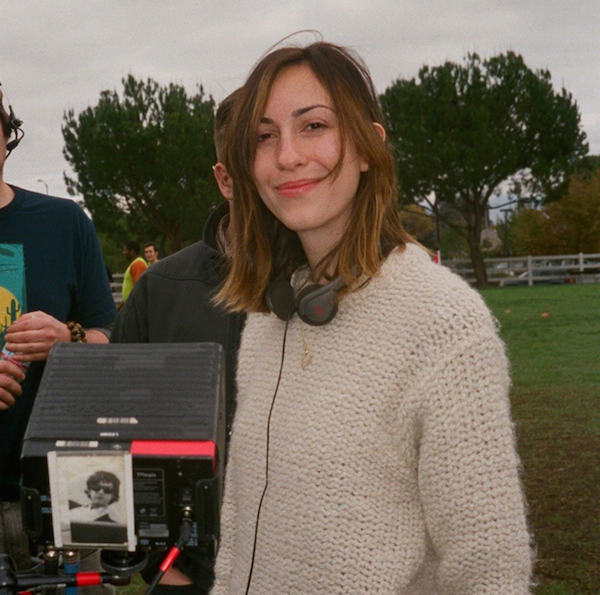
Sophia Stein: James Franco essentially discovered you as a film director.
Gia Coppola: I guess you could say that.
Sophia: You met James Franco at a party at the Museum of Contemporary Art (MOCA) in Los Angeles?
Gia: I had seen James [for the first time in person] earlier that day at a deli, where I was giggling about him with my friends. So when we were introduced later that night at this party, he remembered having seen me earlier. I had just finished college, and he asked what I was doing. I was working as a bar back, but at Bard College, I had majored in photography. At his request, I sent him all my photographs. I guess he really liked my work because he asked me if I would like to collaborate in some way. “I have this book, Palo Alto Stories, and I would like it to become a feature film,” he explained. “I know you have never made a feature film, but I think you can do it.” So I read his short stories with this intention in mind. I fell in love with his book. It takes place in the 90s, but it still is very modern. The dialogue is hip. It’s an authentic depiction of teenagers. There hadn’t been any movies or books about teenagers like that in a while, so I was longing for something like it.
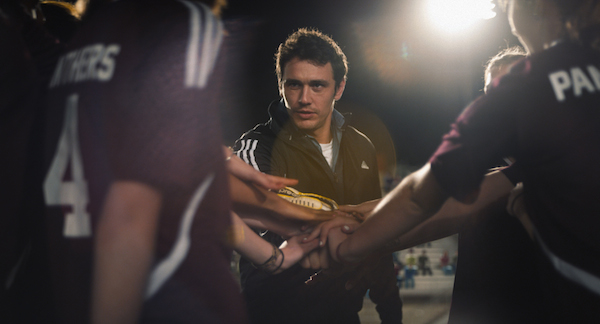
Photo courtesy of San Francisco Film Society, 57th San Francisco International Film Festival.
Sophia: Can you describe the still photographs that you sent to James Franco?
Gia: My photos were a diaristic approach to my life – images of my friends, of little things on my windowsill — photos for my thesis project at Bard College. I like to be an observer. I guess that James thought that the way that I looked at things was interesting.
Sophia: To quote James Franco: “Gia has a way of looking at kids through a prism of the fantastic,” “a way of looking at the world of youth … through a cool, vibrant lens … that gives an otherwise pedestrian existence the sparkle of dreams.” He asserts: “I wanted the Gia Coppola experience.”
Gia: That’s a very poetic and articulate way of putting things. I wish I had better quotes of my own to say about him. I am happy that he is happy because this is his book, and I wanted to do a good job by him.
Sophia: When you met him, did he ask you straight away if you aspired to direct film?
Gia: I had made one short film with my friends that I had sent to him. I was having fun playing around with that new medium. Feature film was not in my mindset. If anything, I was a little bit reluctant about getting into my family’s field of work. I didn’t want that pressure. James really pushed me. James made it so that it was just a collaborative experience with my peers and any sort of pressure could drop away. We took five years to raise the financing. I always expected that we were making a small, student film. For Palo Alto to actually be in theatres is mind-blowing.
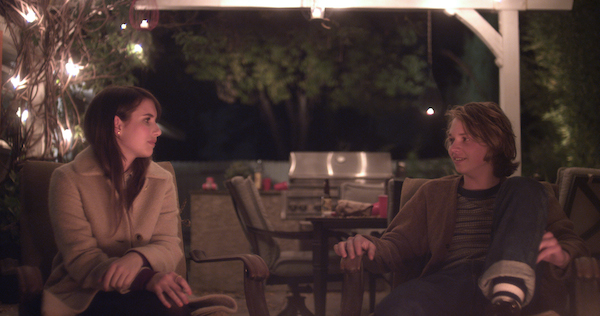
based on short stories by James Franco. Photo courtesy of San Francisco Film Society,
57th San Francisco International Film Festival.
Sophia: The cast is amazing. You had in mind that you wanted to work with real teenagers, age appropriate actors that you knew.
Gia: It was a family affair. Jack [Kilmer] is like a little brother. I have known him since he was four years old. He is a teenager now. He had never acted before, but he has a natural quality about him that makes you just want to watch him.
Sophia: You were in sixth grade when Jack was in kindergarten. Did you ever babysit for him back then?
Gia: In elementary school, I kind of mentored him. I really babysat him while we were making this movie. He lived at my mom’s house during the shoot. I would drive him and Nat [Wolff] back there, and we would all have dinner together. That was the most time I had ever spent with Jack.
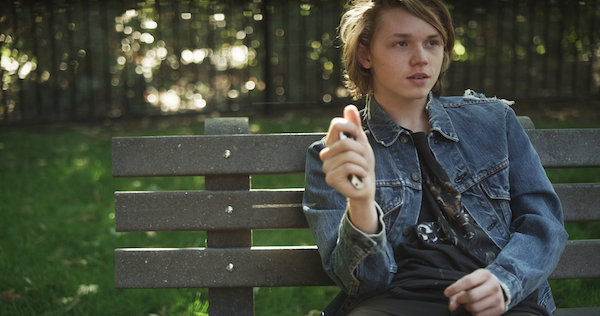
Photo courtesy of San Francisco Film Society, 57th San Francisco International Film Festival.
Sophia: I thought Jack Kilmer was a revelation. As a result of working on your film, do you know if he plans to continue acting?
Gia: I was very nervous for him to step into this world. I felt a lot of responsibility to make sure that he was ok. He is eighteen now, and he is working on another movie [Len and Company]. I think he was really grateful and happy on Palo Alto to be in an environment where everyone was being creative.
Sophia: James Franco has admitted that high school was a difficult time for him. He was getting in trouble. It sounds like it may have been a time of conflict for you, as well?
Gia: What was hard for me in high school was that I simply was not academic. My brain just is not meant for that environment. I felt really discouraged all the time. I was constantly being told that I was not good at anything. I was getting bad grades — being told that I can’t write an essay, that I can’t take tests. It really takes a toll on you at that tender age. I wanted to be creative, but I couldn’t figure out where I wanted to express that creativity. At that age, you don’t understand repercussions, so you live a little more dangerously. I was a terrible driver.
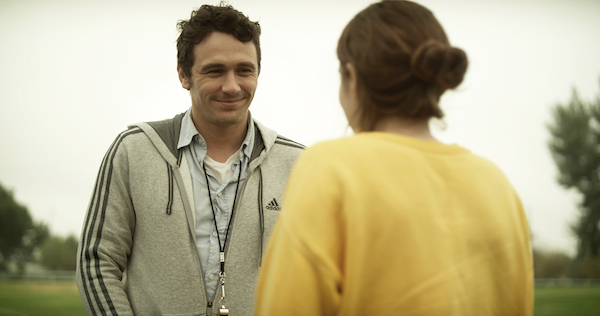
based on short stories by James Franco. Photo courtesy of San Francisco Film Society,
57th San Francisco International Film Festival.
Sophia: Franco has described high school as a transition period when innocence comes up against experience in dangerous and scary ways. All of the adults in the film are so self-involved and distracted. They are not what you would describe as great mentors. They have serious boundary issues. April’s mother, with her electric cigarette, is on the phone all the time; her mom’s boyfriend rewrites April’s history paper; her father gets stoned with Teddy; and her coach propositions her. Were those characters in James’ original book of short stories, or did you develop some of those characters for the screenplay?
Gia: The adults are not as prevalent in the book as they are in the movie. I felt like I wanted to provide a little insight about why the kids were acting the way they were. I wanted to be imaginative about their family backgrounds. As a teenager, I remember that pivotal moment when you realize that any sort of authority figure or adult is a human being too. They are just figuring out their own lives. I remember being able to see things through their eyes just a little bit.
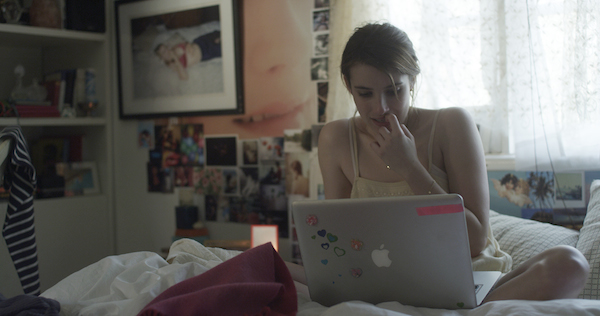
Photo courtesy of San Francisco Film Society, 57th San Francisco International Film Festival.
Sophia: You have said that Palo Alto reflects your own nostalgia for being young. For what specifically from that time, do you feel nostalgic?
Gia: I had recently finished college when I met James Franco. I had had enough separation that I could look back on those high school years with fondness and an appreciation for that awkwardness. I could remember how it had been just so painful sometimes. Yet I was close enough to that time to know how to work with the kids [to direct them].
Sophia: Did you consult with your grandfather Francis Ford Coppola for advice in writing the screenplay or making the film?
Gia: I worked with him on his movie, Twixt. I sat behind the scenes and observed him. That was really my film school. It was a nice time as granddaughter-grandfather to just be with each other from start to finish on a movie. I came to understand the work ethic that has to go into making a movie and all that that you take on. He gave me separation to make my own film with Palo Alto and to learn from my own mistakes — to find my own voice. I begged him to do the voice of the judge. He said only one shot, and I only got one shot.
Sophia: To prepare for shooting, I read that you asked your actors to keep dream journals and you had them act out one another’s dreams. Where did you hear about this technique?
Gia: I was nervous about working with actors, so I was just asking around about improv games. I had seen my grandfather working with actors and used some of his techniques. He has some game where you pass an imaginary ball to everyone, and you have to grab it with a sound. I feel like dreams are an interesting tool to get into writing. It was just something I tried with the actors. We had a week of rehearsals and that week was a time for all of us to get to know each other and for the actors to get comfortable doing things in the vein of their characters. We deliberately did not do the scenes over and over again, so that it would be fresh when we turned on the camera.
Sophia: What did you learn about directing from James Franco?
Gia: James described the inspiration behind all of his characters to me and the actors. When I got stuck at times with blocking, I could lean on James for guidance. He wanted me to have my own interpretation. I was free, but I also had his support when I needed it.
Sophia: There is this shot where April is sitting in a locker. She is so petite, and she fits into the locker as if she is trying to disappear. What inspired that choice?
Gia: That was me in high school.
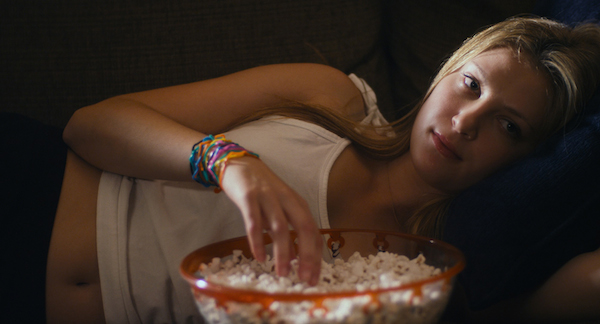
Photo courtesy of San Francisco Film Society, 57th San Francisco International Film Festival.
Sophia: You have compared being a first-time director to the experience of being a teenager: “Your skin breaks out, you’re awkward, insecure and hot-headed.”
Gia: Adolescence is a good subject matter for a first-time director because, in a way, you are going through all of that, all over again. There is no real way to prepare for a first feature. Part of what is so special about making your first movie is that you make mistakes. There are flaws, but they are interesting flaws. I had a conversation with Alexander Payne, and he articulated it well: “Your first feature is like your first waffle. The iron isn’t quite hot, and you make a little bit of a funny looking waffle, but it’s special because it is unique. Your second waffle, you understand how it works a little better. You have more tools. Because you know what to expect, you’re never going to get that naiveté, you won’t have those sorts of “special flaws.” There will be new challenges, so maybe your waffle will still have a little bit of character …”
Top Image: Nat Wolff (Fred) and Jack Kilmer (Teddy) in Gia Coppola’s “PALO ALTO,” based on short stories by James Franco. Photo courtesy of San Francisco Film Society, 57th San Francisco International Film Festival.
